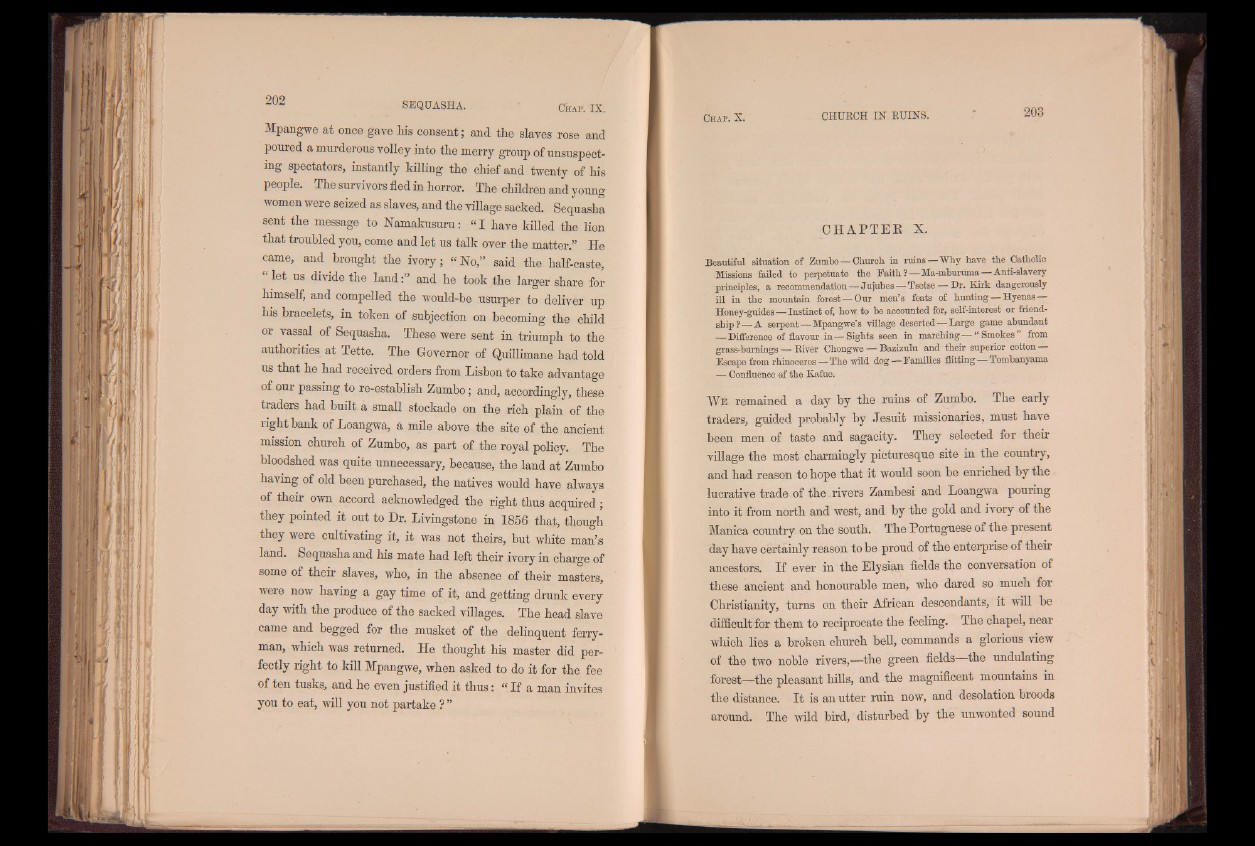
Mpangwe at once gave his consent; and the slaves rose and
poured a murderous volley into the merry group of unsuspecting
spectators, instantly killing the chief and twenty of his
people. The survivors fled in horror. The children and young
women were seized as slaves, and the village sacked. Sequasha
sent the message to Namakusuru: «1 have killed the lion
that troubled you, come and let us talk over the matter.” He
came, and brought the ivory; “No,” said the half-caste,
“ let us divide the l a n d a n d he took the larger share for
himself, and compelled the would-be usurper to deliver up
his bracelets, in token of subjection on becoming the child
or vassal of Sequasha. These were sent in triumph to the
authorities at Tette. The Governor of Quillimane had told
us that he had received orders from Lisbon to take advantage
of our passing to re-establish Zumbo; and, accordingly, these
traders had built, a small stockade on the rich plain of the
right bank of Loangwa, a mile above the site of the ancient
mission church of Zumbo, as part of the royal policy. The
bloodshed was quite unnecessary, because, the land at Zumbo
having of old been purchased, the natives would have always
of their own accord acknowledged the right thus acquired ;
they pointed it out to Dr. Livingstone in 1856 that, though
they were cultivating it, it was not theirs, but white man’s
land. Sequasha and his mate had left their ivory in charge of
some of their slaves, who, in the absence of their masters,
were now having a gay time of it, and getting drunk every
day with the produce of the sacked villages. The head slave
came and begged for the musket of the delinquent ferryman,
which was returned. Hie thought his master did perfectly
right to kill Mpangwe, when asked to do it for the fee
of ten tusks, and he even justified it thus; “ If a man invites
you to eat, will you not partake ? ”
CH A P T E E X.
Beautiful situation of Zumbo —Church in ruins—Why have the Catholic
Missions failed to perpetuate the Faith ?—Ma-mburuma — Anti-slavery
principles, a recommendation—Jujubes—Tsetse — Dr. Kirk dangerously
ill in the mountain forest — Our men’s feats of hunting — Hyenas
Honey-guides —• Instinct of how. to be accounted for, self-interest or friendship?—
A serpent — Mpangwe’s village deserted—Large game abundant
— Difference of flavour in—Sights seen in marching— “ Smokes” from
grass-burnings — River Chongwe — Bazizulu and their superior cotton
Escape from rhinoceros — The wild dog — Families flitting — Tombanyama
— Confluence af the Kafue.
W e remained a day by the ruins- of Zumbo. The early
traders, guided probably by Jesuit missionaries, must have
been men of taste and sagacity. They selected for their
village the most charmingly picturesque site in the country,
and had reason to hope that it would soon be enriched by the
lucrative trade of the rivers Zambesi and Loangwa pouring
into it from north and west, and by the gold and ivory of the
Manica country on the south. The Portuguese of the present
day have certainly reason to be proud of the enterprise of their
ancestors. If ever in the Elysian fields the conversation of
these ancient and honourable men, who dared so much for
Christianity, turns on their African descendants, it will be
difficult for them to reciprocate the feeling. The chapel, near
which lies a broken church bell, commands a glorious view
of the two noble rivers,—the green fields the undulating
forest—the pleasant hills, and the magnificent mountains in
the distance. I t is an utter ruin now, and desolation broods
around. The wild bird, disturbed by the unwonted sound